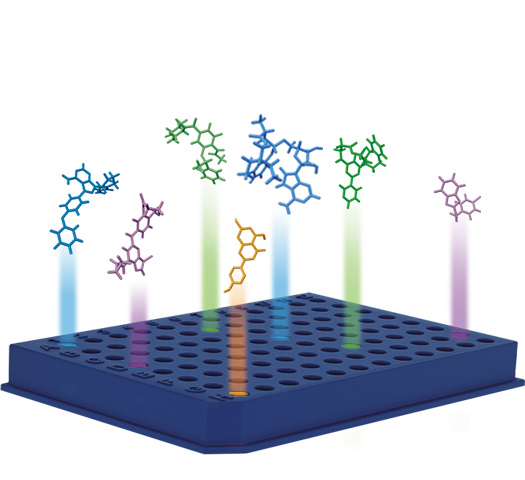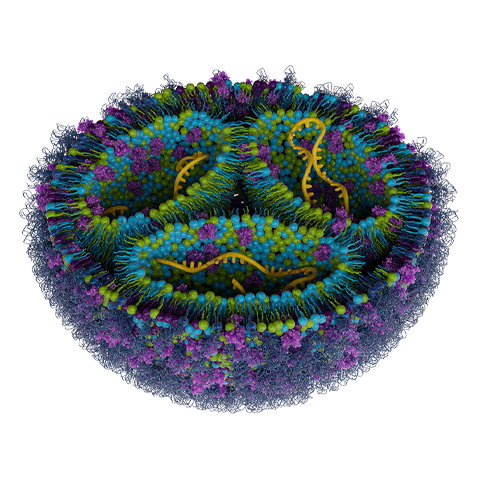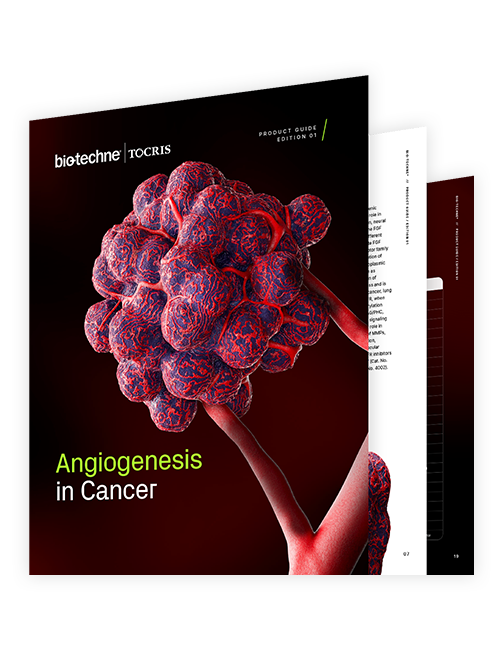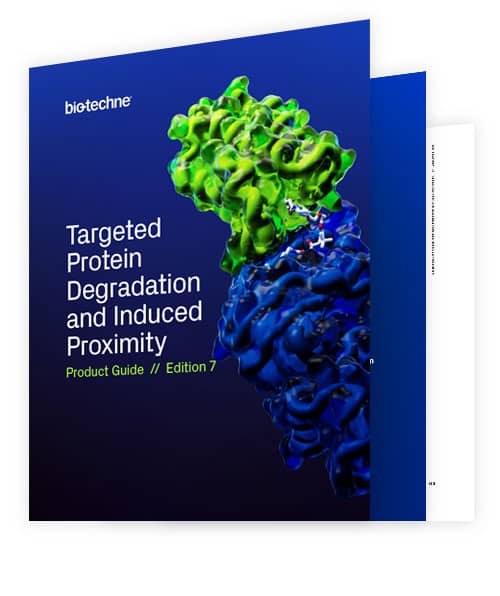Compound Libraries
Compound Libraries
The Tocriscreen™ range of bioactive compound libraries are collections of small molecules designed for use in assays for target validation, tool compound identification, receptor de-orphanization and assay development. The range includes libraries covering a diverse range of research areas and targets, as well as focused libraries for specific targets and drug repurposing.
Protein Degraders
Protein Degraders
Small molecule protein Degraders (e.g. PROTAC® Degraders) are used to achieve selective knock-down of target proteins by harnessing the ubiquitin-proteasome system and without the requirement for genetic modification of cells. Bio-Techne provides a wide range of Protein Degraders and negative controls to help you investigate your target of interest.
Lipid Nanoparticles (LNPs)
Lipid Nanoparticles (LNPs)
LNPs are non-viral drug delivery systems for a wide range of pharmaceutical cargoes, including small molecules, peptides, and nucleic acids, intended for delivery into target cells in vitro or in vivo. Bio-Techne offers all the essential components to help further your LNP research.
Fluorescent Dyes and Probes
Fluorescent Dyes and Probes
Fluorescent dyes and probes allow visualization of intracellular structures and individual proteins, and determination of cell types, in live and fixed cells with high sensitivity and selectivity. Our range includes Janelia Fluor® Dyes, cytoskeletal and microtubule probes as well as innovative probes for imaging bacteria.
CEPT Cocktail
Improve the viability of PSCs with CEPT Cocktail. A combination of 4 small molecules, the CEPT Cocktail enhances cell survival in a wide range of experimental procedures, including routine long-term passaging, single-cell cloning, gene editing, differentiation and cryopreservation of PSCs.
Chemogenetics
Chemogenetic compounds, such as DREADD ligands and PSEMs, act at genetically modified GPCRs and ion channels, respectively. They enable control of neuronal activity, and investigation of downstream signaling pathways, by initiating a signal cascade from a GPCR or opening of an ion channel pore.
TR-FRET and FP Assay Reagents
TR-FRET (Time-Resolved Fluorescence Resonance Energy Transfer) and FP (Fluorescence Polarization) assays are widely used in biology and drug discovery to study target engagement. Discover our range of fluorescent probes, including CoraFluor™ terbium cryptate FRET donors, suitable for exploring ligand binding in TR-FRET and FP assays.
Reagents in Solution
Reagents in Solution
A range of convenient and ready-to-use reagents in solution to save time on your stem cell culture and CGT workflows. Supplied as a sterile-filtered 10 mM solution:
- CHIR 99021 in solution (pre-dissolved in DMSO)
- LDN 193189 in solution (pre-dissolved in water)
- Y-27632 in solution (pre-dissolved in water)
SB 24011 | 8010
SB 24011 | 8010
- Inhibitor of STING-TRIM29 interaction
- Increases cellular STING levels
- Co-administration with cGAMP reduces CT26 and B16F10 tumor volumes in syngeneic mice
RNA Imaging Probe 1c | 8813
RNA Imaging Probe 1c | 8813
- Fluorogenic RNA imaging probe with excellent photostability
- High membrane permeability and strong fluorogenic response on binding RNA
- Compatible with fluorescence lifetime imaging microscopy (FLIM)
- Low cytotoxicity and suitable for live cell imaging
Angiogenesis in Cancer Research Product Guide
Angiogenesis in Cancer Research Product Guide
Our Angiogenesis in Cancer Product Guide provides a background to angiogenesis in cancer and highlights products that can be used to investigate angiogenesis therapeutic targets.
Alzheimer’s Disease Poster
Alzheimer’s Disease Poster
This poster provides an overview of some of the molecular and cellular mechanisms of Alzheimer's disease. Download a digital version of the poster or request a printed copy today.
Targeted Protein Degradation and Induced Proximity Product Guide
Targeted Protein Degradation and Induced Proximity Product Guide
This brochure highlights the tools and services available from Bio-Techne to support your Targeted Protein Degradation and Induced Proximity research. Includes products for target validation, Degrader design, validated antibodies, assays for Degrader development, and tools for induced proximity research.
Reconstitution Calculator
Reconstitution Calculator
Calculate the volume of solvent required to reconstitute the contents of your vial.
Small molecules are organic chemical compounds that have biological activity. They may be used in biological and biomedical research to regulate the activity of proteins such as enzymes, ion channels, receptors and transporters. Many commonly prescribed drugs are small molecules, as they are metabolically stable and can be orally active. Small molecules can be designed to be selective, potent, water-soluble and cell permeable, so have many advantages as research tools.
Peptides are chains of amino acids linked by amide bonds. Bioactive peptides are found in all living organisms; examples include ghrelin, orexin, vasopressin and neuropeptide S. Endogenous peptides generally consist of the 20 naturally occurring L-amino acids. However, peptides as research tools can also incorporate D-amino acids or unnatural amino acids and can have further chemical modifications.
Small molecules and peptides are key tools in biological research as they can be used to modulate or degrade a target of interest to investigate the downstream consequences. Bioactive small molecules and peptides can be categorized according by pharmacological action, e.g. agonists, partial agonists, antagonists, activators, inhibitors and degraders. Our wide range of small molecules includes gold standard pharmacology tools, as well as fluorescent dyes and probes, molecular biology tools including viral transduction enhancers and glycan detection reagents, and biochemicals, such as buffers and chelators.
What are small molecules?
In biological and biomedical research, a small molecule refers to an organic compound that modulates biological activity. Small molecules are generally chemically synthesized, however some small molecules are derived from natural resources, e.g. toxins. As research materials small molecules have advantages; they can be designed to act selectively at a target of interest, and to be potent, water soluble or cell permeable. Many commonly used medicines are small molecules.
Small molecules may also be called biochemicals, chemical probes, and compounds.
What are peptides?
Peptides are short sequences of amino acids linked by amide bonds. Numerous endogenous peptides exist in all living organisms where they play a variety of roles, including within the cardiovascular, endocrine and metabolic systems. Peptides may be chemically synthesized, extracted from natural resources or manufactured recombinantly.
Are small molecules drugs?
Yes, many drugs, both clinically prescribed and illicit drugs, are small molecules. The range of small molecules offered by Tocris, a Bio-Techne brand, includes a large range of compounds that are currently approved for use as medicines. Our catalog also contains compounds that may have failed during clinical trial but are still useful research tools, and compounds that were developed to be tools for in vitro and in vivo research.
Please note that all Bio-Techne products are strictly for use in biomedical research only. They are not intended for human or veterinary use.
PROTAC® is a registered trademark of Arvinas Operations, Inc., and is used under license.













